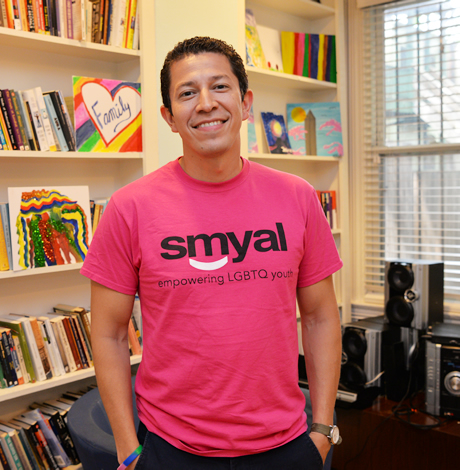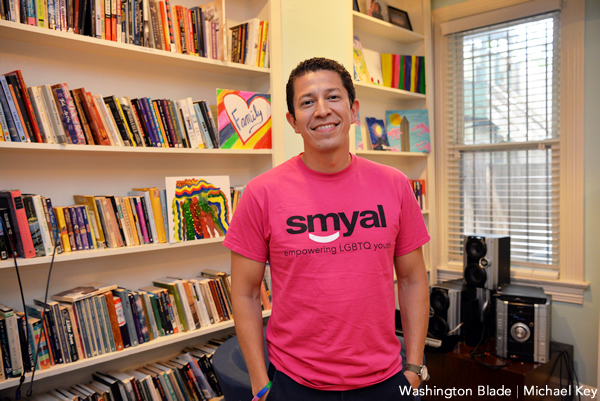Arts & Entertainment
SPOTLIGHTING LGBT HOMELESSNESS: SMYAL’s 18-month shelter program houses LGBT youth
Housing hub inspired by alarming 2015 D.C. study

This story is part of our contribution to the 2018 #DCHomelessCrisis news blitz. Local media outlets will be reporting and discussing stories about ending homelessness in the nation’s capital all day. The collaborative body of work is cataloged at dchomelesscrisis.press.
Chris Lewis aspires to be a beauty influencer on YouTube with millions of subscribers. Although there are few beauty gurus who are men of color, Lewis is ready to pioneer a beauty movement with SMYAL’s transitional housing program serving as a stepping stone for his goals.
The 25-year-old was born in Queens, N.Y., and later raised in the D.C. area. Lewis, who identifies as gay, says he was facing “extreme homelessness to the point where I was sleeping out on the street and in parks and sometimes from couch to couch.”
Lewis found housing with the Wanda Alston Foundation, D.C.’s first transitional house for homeless LGBT youth which opened in 2008. After graduating from the program, Lewis moved into SMYAL’s transitional house in November.
SMYAL’s transitional housing program opened in January 2017 in response to D.C.’s 2015 Homeless Youth Census, which states that 43 percent of homeless youth identify as LGBT.
The facility can accommodate 12 residents at a time for SMYAL’s 18-month program. Since its opening, 13 residents have been housed.
Residents are referred to the program through social workers, doctors, therapists, school personnel or through another agency. Once referred, potential residents come in for interviews and assessments. If the resident is accepted, they receive a welcome kit with toiletries, sheets and towels. Transportation is paid for and Safeway gift cards are distributed for residents to buy their own groceries and cook their own meals.
Director of Youth Housing Jorge Membreño, a program assistant, a case manager or another member of staff is on site anytime between 8 a.m.-6 p.m. The program offers case management for the development of a personal action plan and weekly check-in meetings. Supportive services are offered including medical care, mental health services and self-care support. Residents also learn skills pertaining to job hunting, apartment hunting, finding programs to get food stamps and more. There are also community outings and LGBT youth networking opportunities.
Membreño says there hasn’t been any major behavioral issues so far in the program.
After residents leave the program staff follows up with them for one year through text, email or a phone call at least once a week.
The annual operating budget is funded completely by the D.C. Department of Human Services.
The program is designed for LGBT residents but Membreño says the program doesn’t screen potential residents based on their sexuality. He trusts that LGBT residents looking for a safe place to express themselves will be drawn to the program because they can safely be themselves. Membreño says many of their residents have recounted stories of staying at shelters and having to hide their gender expression or sexuality to be safe.
According to Membreño, LGBT homeless numbers are similar in D.C. compared to other major cities such as New York City and Chicago. However, Membreño thinks the factors for LGBT homelessness are not widely known to the public.
“The one you hear the most is when a family ostracized someone,” Membreño says. “Something we don’t talk about a lot is parental incarceration, low parental involvement, family homelessness. There are different factors that contribute to LGBT homelessness other than just the ostracization.”
Membreño identifies as straight but LGBT homelessness is close to his heart. He started his career as a social worker for the LGBT community and eventually found himself working in homelessness as a school social worker. He also is a licensed therapist and decided to incorporate the world of therapy and social work together.
“The more and more I got involved with it and the more I worked with LGBTQ-identifying youth I decided to merge the two into two passions I loved working with and then being able to focus my attention within the city to make sure that our youth had access to equitable housing and that D.C. was really paying attention,” Membreño says.
Lewis is also realizing his dreams through SMYAL’s transitional housing program. He cites YouTubers Jackie Aina, Jeffree Star and Manny MUA as inspirations for his career. He also credits a friend who died for getting him interested in makeup.
“I want to be in a space where I can create a studio with all my makeup and really reach out to people who are like me, men of color, who want to become a beauty influencer and create a brand that is all-inclusive for everybody,” Lewis says.
In a place like SMYAL’s traditional housing program Lewis’ goals are encouraged in a way that may not be as accepted in a non-LGBT program.
“Having a place where you can identify with the people you’re with also helps create a level of safety, family and community that you might not find in other residential or transitional living centers,” Membreño says.
For more information on SMYAL’s transitional housing program, visit smyal.org.

Friday, January 9
Women in Their Twenties and Thirties will be at 8 p.m. on Zoom. This is a social discussion group for queer women in the Washington, D.C. area. For more details, visit Facebook.
“Backbone Comedy” will be at 8 p.m. at As You Are. Backbone Comedy is a queer-run fundraiser comedy show at As You Are Bar DC, where comics stand up for a cause. Each show, a percentage of proceeds go to a local organization – Free Minds DC, a reentry organization for individuals impacted by incarceration. Tickets cost $19.98 and are available on Eventbrite.
Saturday, January 10
Go Gay DC will host “LGBTQ+ Community Brunch” at 11 a.m. at Freddie’s Beach Bar & Restaurant. This fun weekly event brings the DMV area LGBTQ+ community, including allies, together for delicious food and conversation. Attendance is free and more details are available on Eventbrite.
Monday, January 12
“Center Aging: Monday Coffee Klatch” will be at 10 a.m. on Zoom. This is a social hour for older LGBTQ+ adults. Guests are encouraged to bring a beverage of choice. For more information, contact Adam ([email protected]).
Genderqueer DC will be at 7 p.m. on Zoom. This is a support group for people who identify outside of the gender binary, whether you’re bigender, agender, genderfluid, or just know that you’re not 100% cis. For more details, visit genderqueerdc.org or Facebook.
Tuesday, January 13
Coming Out Discussion Group will be at 7 p.m. on Zoom. This is a safe space to share experiences about coming out and discuss topics as it relates to doing so — by sharing struggles and victories the group allows those newly coming out and who have been out for a while to learn from others. For more details, visit the group’s Facebook.
Trans Discussion Group will be at 7 p.m. on Zoom. This group is intended to provide an emotionally and physically safe space for trans people and those who may be questioning their gender identity/expression to join together in community and learn from one another. For more details, email [email protected].
Wednesday, January 14
Job Club will be at 6 p.m. on Zoom upon request. This is a weekly job support program to help job entrants and seekers, including the long-term unemployed, improve self-confidence, motivation, resilience and productivity for effective job searches and networking — allowing participants to move away from being merely “applicants” toward being “candidates.” For more information, email [email protected] or visit thedccenter.org/careers.
The DC Center for the LGBT Community will partner with House of Ruth to host “Art & Conversation” at 3 p.m. at 1827 Wiltberger St., N.W. This free workshop will involve two hours of art making, conversation, and community. Guests will explore elements of healthy relationships with a community-centered art activity. This workshop involves paint, so please dress accordingly. All materials will be provided. For more details, email [email protected].
Thursday, January 15
The DC Center’s Fresh Produce Program will be held all day at the DC Center for the LGBT Community. People will be informed on Wednesday at 5 p.m. if they are picked to receive a produce box. No proof of residency or income is required. For more information, email [email protected] or call 202-682-2245.
Virtual Yoga Class will be at 7 p.m. on Zoom. This free weekly class is a combination of yoga, breathwork and meditation that allows LGBTQ+ community members to continue their healing journey with somatic and mindfulness practices. For more details, visit the DC Center’s website.
Movies
‘Hedda’ brings queer visibility to Golden Globes
Tessa Thompson up for Best Actress for new take on Ibsen classic

The 83rd annual Golden Globes awards are set for Sunday (CBS, 8 p.m. EST). One of the many bright spots this awards season is “Hedda,” a unique LGBTQ version of the classic Henrik Ibsen story, “Hedda Gabler,” starring powerhouses Nina Hoss, Tessa Thompson and Imogen Poots. A modern reinterpretation of a timeless story, the film and its cast have already received several nominations this awards season, including a Globes nod for Best Actress for Thompson.
Writer/director Nia DaCosta was fascinated by Ibsen’s play and the enigmatic character of the deeply complex Hedda, who in the original, is stuck in a marriage she doesn’t want, and still is drawn to her former lover, Eilert.
But in DaCosta’s adaptation, there’s a fundamental difference: Eilert is being played by Hoss, and is now named Eileen.
“That name change adds this element of queerness to the story as well,” said DaCosta at a recent Golden Globes press event. “And although some people read the original play as Hedda being queer, which I find interesting, which I didn’t necessarily…it was a side effect in my movie that everyone was queer once I changed Eilert to a woman.”
She added: “But it still, for me, stayed true to the original because I was staying true to all the themes and the feelings and the sort of muckiness that I love so much about the original work.”
Thompson, who is bisexual, enjoyed playing this new version of Hedda, noting that the queer love storyline gave the film “a whole lot of knockoff effects.”
“But I think more than that, I think fundamentally something that it does is give Hedda a real foil. Another woman who’s in the world who’s making very different choices. And I think this is a film that wants to explore that piece more than Ibsen’s.”
DaCosta making it a queer story “made that kind of jump off the page and get under my skin in a way that felt really immediate,” Thompson acknowledged.
“It wants to explore sort of pathways to personhood and gaining sort of agency over one’s life. In the original piece, you have Hedda saying, ‘for once, I want to be in control of a man’s destiny,’” said Thompson.
“And I think in our piece, you see a woman struggling with trying to be in control of her own. And I thought that sort of mind, what is in the original material, but made it just, for me, make sense as a modern woman now.”
It is because of Hedda’s jealousy and envy of Eileen and her new girlfriend (Poots) that we see the character make impulsive moves.
“I think to a modern sensibility, the idea of a woman being quite jealous of another woman and acting out on that is really something that there’s not a lot of patience or grace for that in the world that we live in now,” said Thompson.
“Which I appreciate. But I do think there is something really generative. What I discovered with playing Hedda is, if it’s not left unchecked, there’s something very generative about feelings like envy and jealousy, because they point us in the direction of self. They help us understand the kind of lives that we want to live.”
Hoss actually played Hedda on stage in Berlin for several years previously.
“When I read the script, I was so surprised and mesmerized by what this decision did that there’s an Eileen instead of an Ejlert Lovborg,” said Hoss. “I was so drawn to this woman immediately.”
The deep love that is still there between Hedda and Eileen was immediately evident, as soon as the characters meet onscreen.
“If she is able to have this emotion with Eileen’s eyes, I think she isn’t yet because she doesn’t want to be vulnerable,” said Hoss. “So she doesn’t allow herself to feel that because then she could get hurt. And that’s something Eileen never got through to. So that’s the deep sadness within Eileen that she couldn’t make her feel the love, but at least these two when they meet, you feel like, ‘Oh my God, it’s not yet done with those two.’’’
Onscreen and offscreen, Thompson and Hoss loved working with each other.
“She did such great, strong choices…I looked at her transforming, which was somewhat mesmerizing, and she was really dangerous,” Hoss enthused. “It’s like when she was Hedda, I was a little bit like, but on the other hand, of course, fascinated. And that’s the thing that these humans have that are slightly dangerous. They’re also very fascinating.”
Hoss said that’s what drew Eileen to Hedda.
“I think both women want to change each other, but actually how they are is what attracts them to each other. And they’re very complimentary in that sense. So they would make up a great couple, I would believe. But the way they are right now, they’re just not good for each other. So in a way, that’s what we were talking about. I think we thought, ‘well, the background story must have been something like a chaotic, wonderful, just exploring for the first time, being in love, being out of society, doing something slightly dangerous, hidden, and then not so hidden because they would enter the Bohemian world where it was kind of okay to be queer and to celebrate yourself and to explore it.’”
But up to a certain point, because Eileen started working and was really after, ‘This is what I want to do. I want to publish, I want to become someone in the academic world,’” noted Hoss.
Poots has had her hands full playing Eileen’s love interest as she also starred in the complicated drama, “The Chronology of Water” (based on the memoir by Lydia Yuknavitch and directed by queer actress Kristen Stewart).
“Because the character in ‘Hedda’ is the only person in that triptych of women who’s acting on her impulses, despite the fact she’s incredibly, seemingly fragile, she’s the only one who has the ability to move through cowardice,” Poots acknowledged. “And that’s an interesting thing.”
Arts & Entertainment
2026 Most Eligible LGBTQ Singles nominations
We are looking for the most eligible LGBTQ singles in the Washington, D.C. region.

Are you or a friend looking to find a little love in 2026? We are looking for the most eligible LGBTQ singles in the Washington, D.C. region. Nominate you or your friends until January 23rd using the form below or by clicking HERE.
Our most eligible singles will be announced online in February. View our 2025 singles HERE.
-

 National4 days ago
National4 days agoWhat to watch for in 2026: midterms, Supreme Court, and more
-

 District of Columbia5 days ago
District of Columbia5 days agoTwo pioneering gay journalists to speak at Thursday event
-

 Colombia4 days ago
Colombia4 days agoBlade travels to Colombia after U.S. forces seize Maduro in Venezuela
-

 a&e features5 days ago
a&e features5 days agoQueer highlights of the 2026 Critics Choice Awards: Aunt Gladys, that ‘Heated Rivalry’ shoutout and more





















